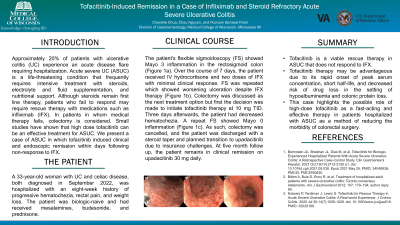Sunday Poster Session
Category: IBD
P0807 - Tofacitinib-Induced Remission in a Case of Infliximab and Steroid Refractory Acute Severe Ulcerative Colitis
Sunday, October 22, 2023
3:30 PM - 7:00 PM PT
Location: Exhibit Hall

Has Audio
- CC
Chanelle Chua, MD
Medical College of Wisconsin
Wauwatosa, WI
Presenting Author(s)
Chanelle Chua, MD, Bao Chau Nguyen, MD, Poonam Beniwal-Patel, MD
Medical College of Wisconsin, Wauwatosa, WI
Introduction: Approximately 20% of patients with ulcerative colitis (UC) experience an acute disease flare requiring hospitalization. Acute severe UC (ASUC) is a life-threatening condition that frequently requires intensive treatment with steroids, electrolyte and fluid supplementation, and nutritional support. Although steroids remain first line therapy, patients who fail to respond may require rescue therapy with medications such as infliximab (IFX). In patients in whom medical therapy fails, colectomy is considered. Small studies have shown that high dose tofacitinib can be an effective treatment for ASUC. We present a case of ASUC in which tofacitinib induced clinical and endoscopic remission within days following non-response to IFX.
Case Description/Methods: A 33-year-old woman with UC and celiac disease, both diagnosed in September 2022, was hospitalized with an eight-week history of progressive hematochezia, rectal pain, and weight loss. The patient was biologic-naive and had received mesalamines, budesonide, and prednisone. The patient's flexible sigmoidoscopy (FS) showed Mayo 3 inflammation in the rectosigmoid colon (Figure 1a). Over the course of 7 days, the patient received IV hydrocortisone and two doses of IFX with minimal clinical response. FS was repeated which showed worsening ulceration despite IFX therapy (Figure 1b). Colectomy was discussed as the next treatment option but first the decision was made to initiate tofacitinib therapy at 10 mg TID. Three days afterwards, the patient had decreased hematochezia. A repeat FS showed Mayo 0 inflammation (Figure 1c). As such, colectomy was cancelled, and the patient was discharged with a steroid taper and planned transition to upadacitinib due to insurance challenges. At five month follow up, the patient remains in clinical remission on upadacitinib 30 mg daily.
Discussion: This case suggests that tofacitinib is a viable rescue therapy in ASUC that does not respond to IFX. Tofacitinib therapy may be advantageous due to its rapid onset of peak serum concentration, short half-life, and decreased risk of drug loss in the setting of hypoalbuminemia and colonic protein loss. This case highlights the possible role of high-dose tofacitinib as a fast-acting and effective therapy in patients hospitalized with ASUC as a method of reducing the morbidity of colorectal surgery.

Disclosures:
Chanelle Chua, MD, Bao Chau Nguyen, MD, Poonam Beniwal-Patel, MD. P0807 - Tofacitinib-Induced Remission in a Case of Infliximab and Steroid Refractory Acute Severe Ulcerative Colitis, ACG 2023 Annual Scientific Meeting Abstracts. Vancouver, BC, Canada: American College of Gastroenterology.
Medical College of Wisconsin, Wauwatosa, WI
Introduction: Approximately 20% of patients with ulcerative colitis (UC) experience an acute disease flare requiring hospitalization. Acute severe UC (ASUC) is a life-threatening condition that frequently requires intensive treatment with steroids, electrolyte and fluid supplementation, and nutritional support. Although steroids remain first line therapy, patients who fail to respond may require rescue therapy with medications such as infliximab (IFX). In patients in whom medical therapy fails, colectomy is considered. Small studies have shown that high dose tofacitinib can be an effective treatment for ASUC. We present a case of ASUC in which tofacitinib induced clinical and endoscopic remission within days following non-response to IFX.
Case Description/Methods: A 33-year-old woman with UC and celiac disease, both diagnosed in September 2022, was hospitalized with an eight-week history of progressive hematochezia, rectal pain, and weight loss. The patient was biologic-naive and had received mesalamines, budesonide, and prednisone. The patient's flexible sigmoidoscopy (FS) showed Mayo 3 inflammation in the rectosigmoid colon (Figure 1a). Over the course of 7 days, the patient received IV hydrocortisone and two doses of IFX with minimal clinical response. FS was repeated which showed worsening ulceration despite IFX therapy (Figure 1b). Colectomy was discussed as the next treatment option but first the decision was made to initiate tofacitinib therapy at 10 mg TID. Three days afterwards, the patient had decreased hematochezia. A repeat FS showed Mayo 0 inflammation (Figure 1c). As such, colectomy was cancelled, and the patient was discharged with a steroid taper and planned transition to upadacitinib due to insurance challenges. At five month follow up, the patient remains in clinical remission on upadacitinib 30 mg daily.
Discussion: This case suggests that tofacitinib is a viable rescue therapy in ASUC that does not respond to IFX. Tofacitinib therapy may be advantageous due to its rapid onset of peak serum concentration, short half-life, and decreased risk of drug loss in the setting of hypoalbuminemia and colonic protein loss. This case highlights the possible role of high-dose tofacitinib as a fast-acting and effective therapy in patients hospitalized with ASUC as a method of reducing the morbidity of colorectal surgery.

Figure: Figure 1A: Initial flexible sigmoidoscopy revealing Mayo 3 inflammation in the rectosigmoid colon.
Figure 1B: Rectosigmoid colon following several days of IV hydrocortisone and two doses of infliximab.
Figure 1C: Rectosigmoid colon demonstrating mucosal healing after five days of tofacitinib therapy.
Figure 1B: Rectosigmoid colon following several days of IV hydrocortisone and two doses of infliximab.
Figure 1C: Rectosigmoid colon demonstrating mucosal healing after five days of tofacitinib therapy.
Disclosures:
Chanelle Chua indicated no relevant financial relationships.
Bao Chau Nguyen indicated no relevant financial relationships.
Poonam Beniwal-Patel indicated no relevant financial relationships.
Chanelle Chua, MD, Bao Chau Nguyen, MD, Poonam Beniwal-Patel, MD. P0807 - Tofacitinib-Induced Remission in a Case of Infliximab and Steroid Refractory Acute Severe Ulcerative Colitis, ACG 2023 Annual Scientific Meeting Abstracts. Vancouver, BC, Canada: American College of Gastroenterology.
